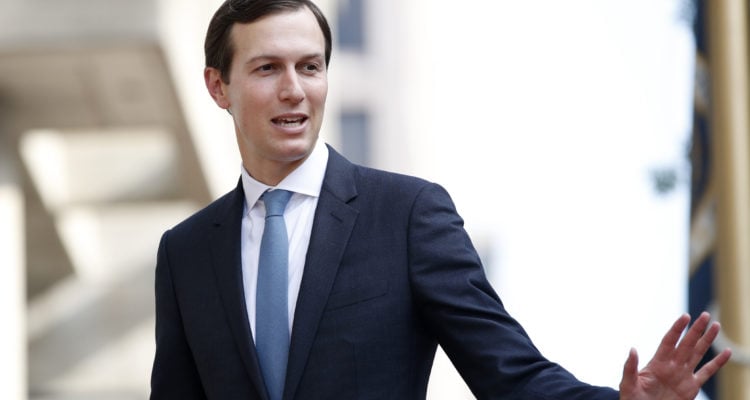The Trump administration on Saturday unveiled a $50 billion Palestinian investment and infrastructure proposal to power its much-anticipated “deal of the century” Middle East peace plan.
By Associated Press
The economic portion of the Trump administration’s long-awaited “deal of the century” Mideast peace plan was unveiled on Saturday, which calls for a mix of public and private financing and intends to create at least a million new jobs for Palestinians.
The $50 billion initiative was posted to the White House website ahead of a two-day conference in Bahrain that is being held amid outright opposition from the Palestinians.
The Bahrain conference, dubbed the “Peace to Prosperity” workshop, will take place on Tuesday and Wednesday amid heightened regional tensions over Iran that threaten to overshadow its goals.
With no official participation from the two main actors, Israel and the Palestinians, and the distraction of potential U.S.-Iran conflict, expectations are decidedly low. President Donald Trump’s senior adviser Jared Kushner faces high hurdles in building support for the initiative.
The 10-year plan calls for projects worth $27.5 billion in Judea and Samaria and Gaza, and $9.1 billion, $7.4 billion and $6.3 billion for Palestinians in Egypt, Jordan and Lebanon, respectively. Projects envisioned include those in the health care, education, power, water, high-tech, tourism, and agriculture sectors. It calls for the creation of a “master fund” to administer the finances and implementation of the projects that it says are akin to the Marshall Plan that rebuilt Europe after World War II.
The plan foresees more than doubling the Palestinian gross domestic product, reducing the Palestinian poverty rate by 50 percent and cutting the Palestinian unemployment rate to nearly single digits, according to the documents, which do not specify exactly how the projects will be funded.
“Generations of Palestinians have lived under adversity and loss, but the next chapter can be defined by freedom and dignity,” the White House said, calling the plan “the most ambitious international effort for the Palestinian people to date.”
Notwithstanding the economic dimensions of the plan, core political issues key to resolving the dispute, such as borders, the status of the holy city of Jerusalem, Israel’s security and the fate of Palestinian refugees, will not be raised. Such matters, U.S. officials have said, may have to wait until the fall, after Israeli elections, leaving numerous questions that potential investors almost certainly want answers to before making even tentative financial commitments.
Legacy of Palestinian rejectionism
Meanwhile, Palestinian leaders remain angered by the U.S.’s new diplomatic approach to the conflict, and want nothing to do with the workshop, refusing to participate. The Palestinians have called for mass demonstrations against the conference on Monday, Tuesday and Wednesday.
“We reject this workshop,” said Nabil Abu Rdeneh, Palestinian President Mahmoud Abbas’ spokesman. “We will not agree to any meeting without a political horizon. Our cause is a political one and should be dealt with as such. It is a strategic mistake and the American administration is committing daily mistakes against the Palestinian people. Without Palestinian approval, there is no value to any meeting, and without a political horizon, no one will deal with any effort. This conference was born dead just like the deal of the century.”
In Gaza, the rival Hamas terror group also condemned the conference. “In one voice, we say no to the Manama workshop and the deal of the century,” Hamas leader Ismail Haniyeh said. He appealed to Bahrain’s king to “take a brave, strong, authentic Arab decision not to host this workshop” and called on Arab countries to cancel their planned participation.
Complicating the Bahrain meeting is the fact that it coincides with a pledging conference in New York for the U.N. agency for Palestinians (UNRWA), a 70-year-old institution that the Trump administration has defunded and wants to eliminate entirely. UNRWA has been plagued for decades with scandals related to its ties to Hamas and the anti-Semitic curriculum taught in its schools, which promotes terror, including the murder of Israeli civilians.
Kushner’s peace plan partner Jason Greenblatt has publicly called for UNRWA’s dissolution. Greenblatt argued last month that the agency perpetuates Palestinian victimhood, abets anti-Israel sentiment and is an inefficient drain on funds that could be better directed.
Regardless of American intent, the dueling meetings are likely to leave donors, particularly European nations, torn between supporting either UNRWA, which many see as a near complete failure in accomplishing its mission, or the U.S. administration’s new vision for the Middle East.
Since Trump took office, he has recognized that Jerusalem is Israel’s capital, moved the U.S. embassy there from Tel Aviv, downgraded the consulate devoted to Palestinian issues, shut down the Palestinian office in Washington and slashed hundreds of millions of dollars in assistance to Palestinians in Judea and Samaria and Gaza.
“This is trying to dangle some benefits to the Palestinians to accept terms they already rejected,” said Shibley Telhami, a Mideast scholar and the Anwar Sadat professor for peace and development at the University of Maryland. “A lure to get the Palestinians to accept the unacceptable is not going to work. It’s impossible.”





